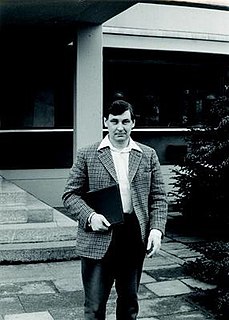In mathematics, the Iwahori–Hecke algebra, or Hecke algebra, named for Erich Hecke and Nagayoshi Iwahori, is a deformation of the group algebra of a Coxeter group.
In abstract algebra, an adelic algebraic group is a semitopological group defined by an algebraic group G over a number field K, and the adele ring A = A(K) of K. It consists of the points of G having values in A; the definition of the appropriate topology is straightforward only in case G is a linear algebraic group. In the case of G being an abelian variety, it presents a technical obstacle, though it is known that the concept is potentially useful in connection with Tamagawa numbers. Adelic algebraic groups are widely used in number theory, particularly for the theory of automorphic representations, and the arithmetic of quadratic forms.

Ian Grojnowski is a mathematician working at the Department of Pure Mathematics and Mathematical Statistics at the University of Cambridge.

Ian Grant Macdonald is a British mathematician known for his contributions to symmetric functions, special functions, Lie algebra theory and other aspects of algebra, algebraic combinatorics, and combinatorics.
In mathematics, Macdonald polynomialsPλ(x; t,q) are a family of orthogonal symmetric polynomials in several variables, introduced by Macdonald in 1987. He later introduced a non-symmetric generalization in 1995. Macdonald originally associated his polynomials with weights λ of finite root systems and used just one variable t, but later realized that it is more natural to associate them with affine root systems rather than finite root systems, in which case the variable t can be replaced by several different variables t=(t1,...,tk), one for each of the k orbits of roots in the affine root system. The Macdonald polynomials are polynomials in n variables x=(x1,...,xn), where n is the rank of the affine root system. They generalize many other families of orthogonal polynomials, such as Jack polynomials and Hall–Littlewood polynomials and Askey–Wilson polynomials, which in turn include most of the named 1-variable orthogonal polynomials as special cases. Koornwinder polynomials are Macdonald polynomials of certain non-reduced root systems. They have deep relationships with affine Hecke algebras and Hilbert schemes, which were used to prove several conjectures made by Macdonald about them.
In mathematics, an affine Hecke algebra is the algebra associated to an affine Weyl group, and can be used to prove Macdonald's constant term conjecture for Macdonald polynomials.
Affine algebra may refer to:
In representation theory, a Yangian is an infinite-dimensional Hopf algebra, a type of a quantum group. Yangians first appeared in physics in the work of Ludvig Faddeev and his school in the late 1970s and early 1980s concerning the quantum inverse scattering method. The name Yangian was introduced by Vladimir Drinfeld in 1985 in honor of C.N. Yang.
Daha or DAHA may refer to:
In mathematical physics, the quantum KZ equations or quantum Knizhnik–Zamolodchikov equations or qKZ equations are the analogue for quantum affine algebras of the Knizhnik–Zamolodchikov equations for affine Kac–Moody algebras. They are a consistent system of difference equations satisfied by the N-point functions, the vacuum expectations of products of primary fields. In the limit as the deformation parameter q approaches 1, the N-point functions of the quantum affine algebra tend to those of the affine Kac–Moody algebra and the difference equations become partial differential equations. The quantum KZ equations have been used to study exactly solved models in quantum statistical mechanics.
In mathematics, a double affine Hecke algebra, or Cherednik algebra, is an algebra containing the Hecke algebra of an affine Weyl group, given as the quotient of the group ring of a double affine braid group. They were introduced by Cherednik, who used them to prove Macdonald's constant term conjecture for Macdonald polynomials. Infinitesimal Cherednik algebras have significant implications in representation theory, and therefore have important applications in particle physics and in chemistry.
In mathematics, a double affine braid group is a group containing the braid group of an affine Weyl group. Their group rings have quotients called double affine Hecke algebras in the same way that the group rings of affine braid groups have quotients that are affine Hecke algebras.
In mathematics, an affine braid group is a braid group associated to an affine Coxeter system. Their group rings have quotients called affine Hecke algebras. They are subgroups of double affine braid groups.
In mathematics, a Hecke algebra is classically the algebra of Hecke operators studied by Erich Hecke. It may also refer to one of several algebras :
In mathematics, a Hecke algebra of a locally compact group is an algebra of bi-invariant measures under convolution.
Ivan Cherednik is a Russian-American mathematician. He introduced double affine Hecke algebras, and used them to prove Macdonald's constant term conjecture in. He has also dealt with algebraic geometry, number theory and Soliton equations. His research interests include representation theory, mathematical physics, and algebraic combinatorics. He is currently the Austin M. Carr Distinguished Professor of mathematics at the University of North Carolina at Chapel Hill.
Xuhua He is a Chinese mathematician.
Michela Varagnolo is a mathematician whose research topics have included representation theory, Hecke algebra, Schur–Weyl duality, Yangians, and quantum affine algebras. She earned a doctorate in 1993 at the University of Pisa, under the supervision of Corrado de Concini, and is maître de conférences in the department of mathematics at CY Cergy Paris University, affiliated there with the research laboratory on analysis, geometry, and modeling.